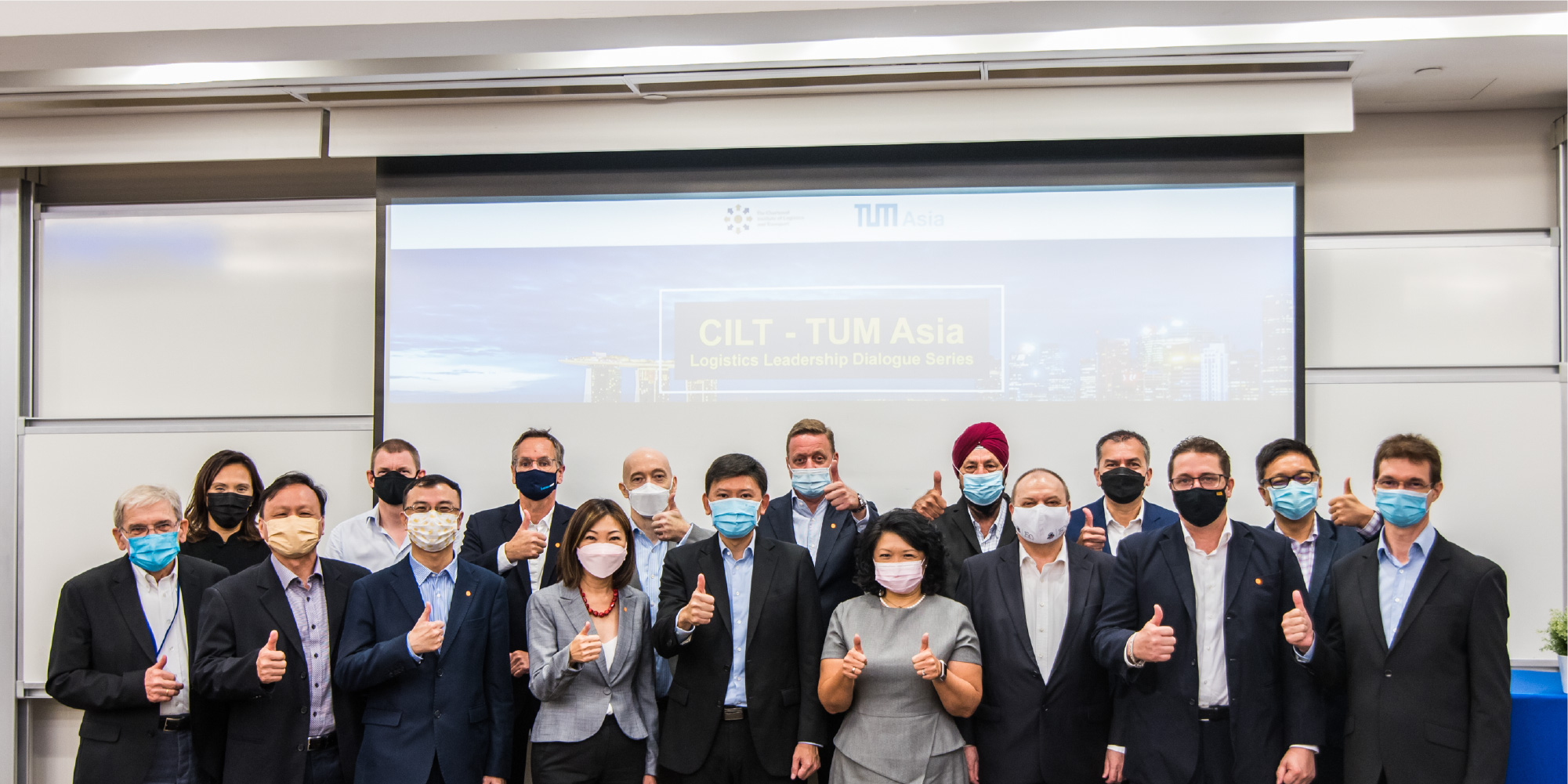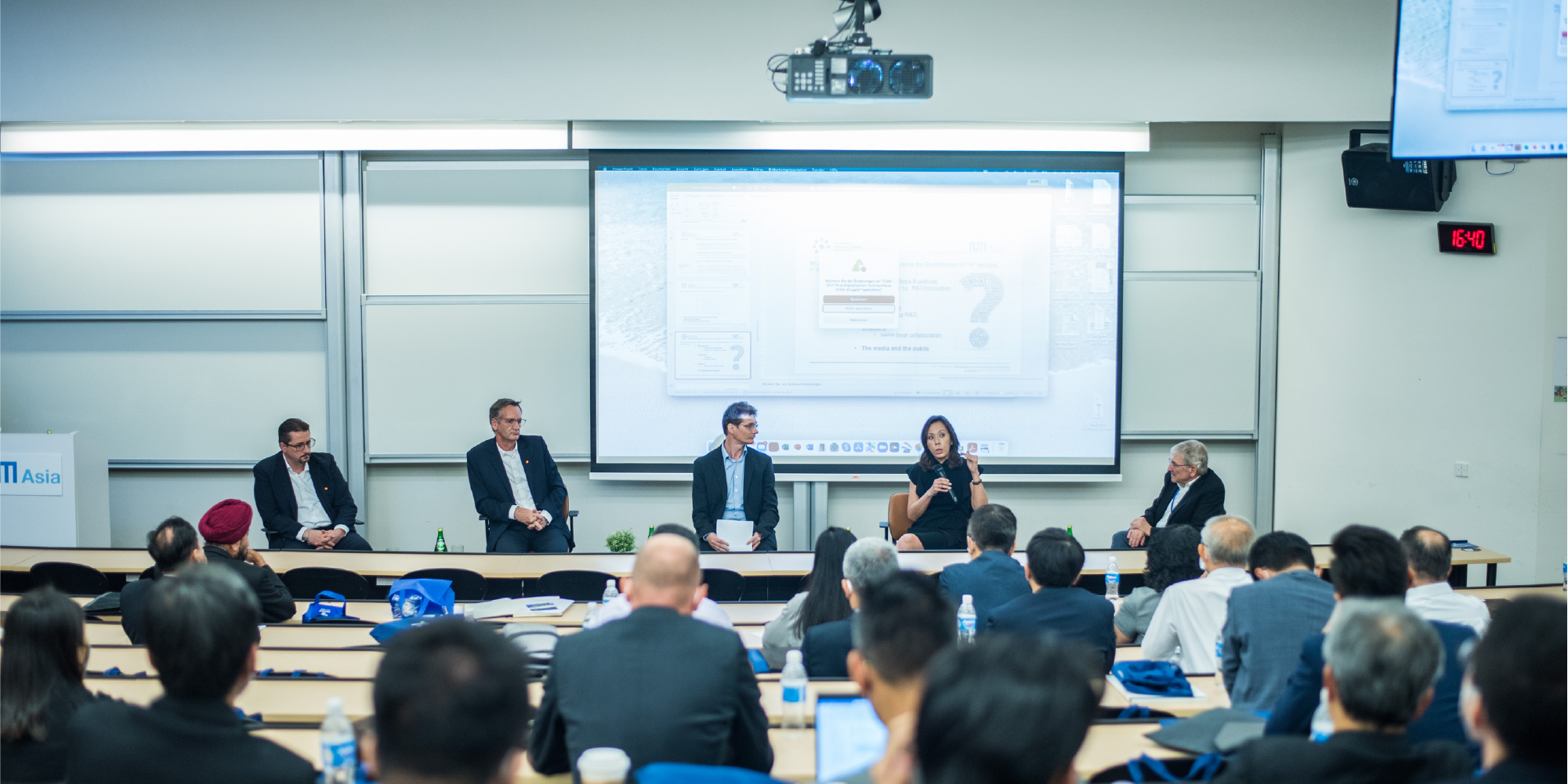 The Logistics Leadership Dialogue Series, jointly organised by TUM Asia and CILT Singapore, brought together seven top global logistics leaders to spearhead discussions and strategise solutions to address the evolving challenges faced by local SMEs
The Logistics Leadership Dialogue Series, jointly organised by TUM Asia and CILT Singapore, brought together seven top global logistics leaders to spearhead discussions and strategise solutions to address the evolving challenges faced by local SMEs
Senior Minister of State for Transport, Mr Chee Hong Tat, graced the opening session as Guest-of-Honour and gave a keynote address that highlighted the importance of digitalization and the various initiatives the Singapore Government in enabling companies to embark on their own digitlisation journey.
The steady onslaught of disruptions in global supply chains has further laid bare the fragilities of today’s global supply chains and underscored the need for companies to bolster their supply chains to weather the volatilities
Comprising six modules, the Logistics Leadership Dialogue series focused on the digitalisation challenges, opportunities and solutions unique to the specific industry to provide SMEs with a solid context to replicate such successful strategies.
Friday, 1 April 2022 – The Technical University of Munich (TUM) Asia held the first-of-its-kind Logistics Leadership Dialogue Series with the Chartered Institute of Logistics and Transport (CILT) Singapore, bringing together seven top global leaders in supply chain management and logistics solutions, to spearhead discussions on the strategic challenges faced by local SMEs, while providing specialised know-how and strategies for participants to start successful initiatives amid mounting supply chain disruptions. By combining real-world experiences with academic knowledge, this dialogue series featured a cadre of eminent supply chain professors such as Professor Peter Klaus of the Technical University of Munich (TUM) Asia and Prof. Dr.-Ing. Johannes Fottner from the TUM to share their research insights and knowledge in this field.
Senior Minister of State for Transport, Mr Chee Hong Tat, graced the opening session as Guest-of-Honour and gave a keynote address that highlighted the importance of digitalisation and the various initiatives the Singapore Government has taken in enabling companies to embark on their own digitalisation journey.
Digitalisation challenges amid escalating supply chain shocks
The 2020 SME Digital Transformation Study produced jointly by Microsoft Singapore, and the Association of Small and Medium Enterprises (ASME)[1] revealed that despite over 80 per cent of local SMEs embracing digital transformation, 54 per cent reported delays in their digitalisation plans due to the COVID-19 pandemic. Despite higher adoption of digital transformation, only two in five SMEs perceive their efforts to be successful.
In addition to their digitalisation challenges, SMEs continue to be hard hit by ongoing supply chain shocks. The steady onslaught of disruptions in global supply chains has laid bare the fragilities of today’s global supply chains and underscored the need for companies to bolster their supply chains to weather the volatilities. The Interos Annual Global Supply Chain Report [2]revealed that the global supply chain disruptions in the last two years had cost large companies, on average, $184 million a year. In another survey with 400 C-suite executives at European and U.S. global companies conducted by GEP [3], 64 per cent reported revenue losses between 6 per cent and 20 per cent in 2020, amounting to a total financial cost of $4 trillion due to supply chain disruptions.
Bolstering the supply chain resilience
Against this backdrop, the CILT-TUM Logistics Leadership Dialogue Series aimed to address the mounting challenges by providing the know-how to top management executives of SMEs in navigating this new dynamic presented by top global logistics leaders. Targeted at the top management levels of SMEs and larger transport and supply chain organisations, the dialogue series were helmed by the top executives of global logistics leaders to share their experiences of their digitalisation journey while providing opportunities for participants to discuss critical issues and share expertise to bolster supply chain resilience collectively. In addition, participants were given a rare inside look at companies’ warehouse operations to provide a solid context for SMEs to replicate such successful strategies. The first module of the dialogue series on 1 April focused on the challenges of “Digitalisation” in the Singapore logistics industry.
Dual vocational training system: Combining real-world experiences with expert inputs
The genesis of the CILT-TUM Asia Leadership Dialogue Series underpins the German educational concept of a “dual vocational training system”. By bringing together real-world experiences, dual expert inputs from academic professors and industry experts, and reinforcing learning through small peer group interaction, the dialogue series aims to present the best of both traditional teaching methodologies and the application of industry knowledge to equip the logistics professionals with fresh choices and perspectives to recalibrate their business strategies to ones that are more resilient and flexible.
The modules curated by our knowledge experts and top global logistics leaders provided real-world experiences and specialised know-how to navigate this new dynamic. These modules demonstrated how participants can glean invaluable insights into the projects and initiatives presented by the top global logistics leaders that enable logistics professionals to pivot as circumstances evolve.
The subsequent modules will be held at the respective supporting companies’ logistics centres focusing on the digitalisation challenges and opportunities unique to their industry.
Module 1: Digitalising Singapore’s Logistics Service Provider Industry
 Hosted at TUM Asia campus
Hosted at TUM Asia campus
The first module of the logistics leadership dialogue series convened the leaders of the top global logistics companies in a panel discussion as they shared about the key opportunities and challenges of digitalisation for the transport and logistics sector in Singapore. Professor Peter Klaus gave an expert insight on the promises and challenges of digitalisation.
Module 2: Digitalisation for the Global Air & Ocean Forwarding Industry

Hosted at DB Schenker
This module focused on the digitalisation challenges of the global forwarding industry and its digital solutions employed to address such challenges. Participants were given the opportunities to exchange their experiences with the hosts and strategise solutions to address the evolving challenges in digitalisation in the forwarding industry.
Module 3: Digitalisation for Cargo Carrier Operations
 Hosted at Kühne+Nagel Singapore Logistics Hub
Hosted at Kühne+Nagel Singapore Logistics Hub
This module focused on the digitalisation challenges of the container line and air cargo carrier industries. Participants were given the opportunity to share experiences of working with carriers and the digital solution approaches to address the unique scenarios.
Module 4: Promises and Challenges of new Digital Technologies for Logistics and Supply Chain Operations
 Hosted at DHL Logistics facility equipped by Beumer Group
Hosted at DHL Logistics facility equipped by Beumer Group
This module focused on the available and emerging new digitalisation technologies. There was an on-site demonstration of their advanced technology system to provide participants with a deep understanding of the potential and risks of the technologies employed.
Module 5: Digitalisation for Contract Logistics and Other Warehousing Operations by Geodis
 Hosted at Geodis
Hosted at Geodis
Module 5 focused on how technology can be best integrated into warehousing, storage, and distribution services to streamline processes, bolster demand management, and upgrade forecasting abilities to seamlessly navigate unexpected challenges and avenues, including factors like the e-commerce boom driven by the pandemic.
Module 6: Petrochemical Logistics / Digital Security in the Supply Chain
 Hosted at SingTel Cyber Security Institute
Hosted at SingTel Cyber Security Institute
This module focused on cybersecurity issues in relation to supply chain digitalisation. There will also be an exchange of digitalisation experiences within the petrochemical industry in Singapore and how they have overcome the challenges unique to their landscape. Lastly, Professor Peter Klaus concluded the Logistics Leadership Dialogue Series by sharing his insights and knowledge of the logistics industry.
[1]https://news.microsoft.com/en-sg/2020/10/22/over-80-of-singapore-smes-embrace-digital-UTtransformation-more-than-half-report-slowdowns-due-to-covid-19-asme-microsoft-study-2020/
[2] https://www.interos.ai/resources/global-supply-chain-report/
[3] https://www.cips.org/supply-management/news/2021/march/total-cost-of-supply-chain-disruption-in-2020-was-4tn/